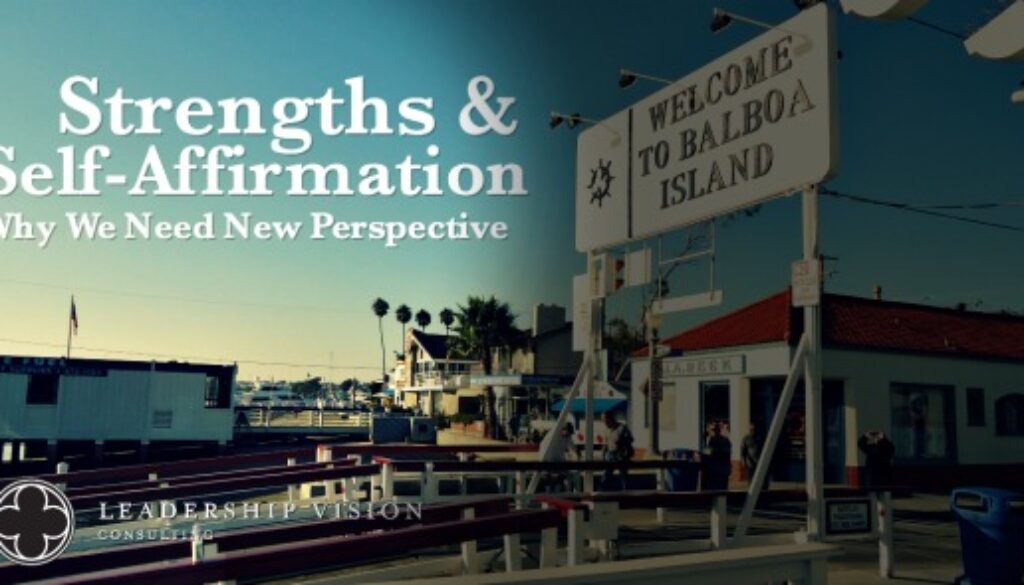Strengths and Self-Affirmation… Why We Need New Perspective
When I was in my mid-thirties I found myself on the top of the world – or so I thought. I found myself on a ferry from Los Angeles to Balboa Island. It was a sunny morning; I was leaning against a new Toyota Landcruiser, shoulder to shoulder with my new mentor. I was excited to spend the day with a man who himself was an innovative leader, critical thinker, author and global influencer.
Here we were, about to spend the day together, which I thought, would be a time when we would share about our successes, leadership, and how we could work together in the future. I saw nothing but a bright future for me, and I sincerely thought that I deserved to be in this moment… I had earned it.
I had no idea what was in store for me.
As the ferry pulled away from the pier, we began with some small talk. Then we began talking about an event we had just done together, which I thought went incredibly well. My mentor and I had partnered on this event, we had each brought a team of people, worked side by side, and accomplished what I thought was one of the best events I had ever been involved in.
My mentor, Michael, then said to me, “Brian, I need to share something with you.”
This, I thought, was the moment when he was going to praise me for my leadership and the skills that I had.
Michael continued,
Brian, you are one of the most greedy people that I know. I am not sure that I can work with you if you do not change. And I certainly will not let my team work with you if you continue in this direction.
Suffice it to say, my worldview came to a sudden and screeching halt.
The funny thing is that I knew exactly what he meant. Michael simply said, you believe you deserve what you do not have. You believe you are stronger than you really are. Michael’s wisdom was true, and it raised a completely new question. Not, “Are you the right person for this new job?” But, “Are you strong enough?”
I did not know. Was I strong enough for this new position of influence?
What was in store for me was a four year journey with Michael, which focused more on who I was as a person than anything else. This beginning was nothing new, I knew the importance of understanding who you were, pressing into that, and seeking the right help to make the best of the opportunities in front of me. I have been coached athletically all my life. I have been mentored many times in the past. But this moment, this beginning, was something different.
As Michael and I stepped onto Balboa Island the symbolism was too great to be missed. Physically I was on an island. And I knew that if I did not change, I would soon find myself, personally and professionally, on an inescapable and inaccessible island. I accepted the challenge.
Why I am sharing this Story
This day on Balboa Island came at the beginning of my journey with strengths. The year was 2000, and a year earlier I had just received my StrengthsFinder results for the first time. I thought,
“These 5 strengths really help me affirm who I am.”
And yes, strengths can be used to affirm who you are, but what I needed to learn was this – for strength to really make a difference in one’s life, they need to do more than provide a means for self-affirmation.
Strengths and Self-Affirmation
At first, I used strengths as a means of self-affirmation. I read my StrengthsFinder results and I used what I read to affirm who I was more than anything else. I saw these five strengths as unique ways to affirm what I had accomplished, to affirm how I related to other people, to affirm how I made decision and to affirm how I was feeling and influencing others. Using strengths for self-affirmation is not a bad place to start, but there is a danger to it if we stop here.
Strengths and self-affirmation can also isolate
While strengths can affirm what we do, they can also provide a way to not participate. This may sound something like this,
“Well, I do not have the strength of _______ , so I cannot help.” Or someone saying, “I have the strength of _______ , and that is not what is needed.”
Many times I have heard people affirm their strengths and by so doing they justify why they should not be involved in something, or why someone else should take responsibility. This is how strengths and self-affirmation fall short.
Each of the statements above is a statement of self-affirmation: a person knowing their strengths well enough to inform and confirm who they are and what they have done. But here is the key: self-affirmation is past tense(!), it is not present tense. Using strengths for self-affirmation helps in understanding how your strengths have come to life in the past. This is good, but there is more.
If we stop with self-affirmation, then we will tend to only look for places to apply our strengths that are familiar. We may find ourselves applying our strengths only at times that look and sound like the opportunities of the past. This will often isolate and exclude someone from applying their strengths in new and innovative ways. Here, is where we need to lean into our strengths in ways that will move us off of this island of isolation and justification and into a more meaningful relationship with others.
Using our awareness of our StrengthsFinder themes for self-affirmation is a great place to start. I believe that if we only accomplish this, we may never be strong enough for a truly generative and sustainable application of our strengths. I contend that we also need to apply our strengths to these three areas as well:
- Self-Awareness
- Self-Acceptance
- Self-Advocacy
Strengths and Self-Awareness
Strengths and Self-Awareness: using your strengths to identify how you think, how you make things happen, how you influence others and how you form relationships.
Knowing our strengths will provide us with a great platform for self-awareness. When we become more self aware of our unique characteristics of strength, we are also becoming more aware of what bring us life and joy. Let us not be afraid to ask others to help us be more self aware. This objective awareness of strengths, from another’s perspective, will give us a truer understanding of our strengths and our potential.
Strengths and Self-Acceptance
Strengths and Self Acceptance: using your strengths to explain who you are, and who you are not.
Knowing your strengths can help us with our self-acceptance, being able to say, “this is me.” Strengths and self-acceptance is also a way of letting strengths explain how and why others are who they are, and who they are not. This one factor can be very liberating in our relationships. Let us not be afraid to ask others to help us accept this new strengths reality. This challenge is about accepting the maturity and influence of our strengths… not all strengths are fully formed or helpful to others.
Strengths and Self-Advocacy
Strengths and Self-Advocacy: using your strengths to inform how you speak about your strengths and how you can give yourself to whatever situation you find yourself in.
Strengths and self-advocacy is a way of seeing, speaking and relating with one another. Strengths and self-advocacy is when strengths – those behaviors that are unique, one of a kind, to all of us – become the tone of our language with one another. Self-advocacy is when we can explain what is happening so that others may receive the life giving nature of strengths. Let us not be afraid to speak out and speak up for the life within us. And let us certainly not be afraid to speak out and speak up for the life within others. This common language of strengths has such potential to unite people together, but it first must be heard.
So what difference does this make?
On that day on Balboa Island, there was so much that I needed to learn. What I did not know was how to make a difference with the strengths, education and experience that had been afforded to me. I did not know how all the pieces needed to work together. I did not know the meaning of all that had led me to this point in my life.
The greatest challenge before me was to accept that I needed to be in relationship, an intentional relationship focused on who I really was, not the person I thought of myself to be. Yes, I needed help in affirming who I was. Yes, I needed to be more self-aware. Yes, I needed to learn how to truly accept who I was and who I was not. Yes, I needed help advocating for others and myself.
But more than anything else, I needed to face each of these challenges in an intentional relationship. This relational and intentional approach, more than strengths, has shaped my understanding of others and myself. And this is what I hope we each may receive: a unique and personal strategy on how to use strengths in a relational and intentional way, to truly make a lasting difference in people.
As we each seek to understand ourselves better and leverage the strengths we have been made aware of, my first and lasting advice is that we do so relationally and intentionally. I believe that no one can grow in strengths alone, we need others. I also believe that an awareness and acceptance of our strengths will help us be more intentional with our decisions, work and thinking. But most importantly, I believe our strengths will help in building stronger relationships with one another.





